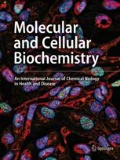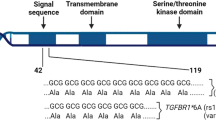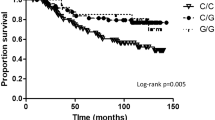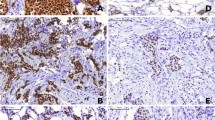Abstract
Genetic factors related to cancer have been extensively studied and several polymorphisms have been associated to breast cancer. The FGFR4, MTHFR, and HFE genes have been associated with neoplastic diseases development. The current report outlines the analysis of the polymorphisms G388A (FGFR4), C677T (MTHFR), C282Y, and H63D (HFE) in Brazilian breast cancer patients. We studied 68 patients with invasive ductal and operable breast carcinoma and 85 women as a control group. The polymorphism frequencies in the breast cancer and control groups were analyzed, but no significant difference was observed by comparing the two groups. The presence of each polymorphism was analyzed according to the clinical features and markers already established as prognostic in the breast cancer group. The C677T, H63D, and G388A polymorphisms were not associated to histological grade, age of diagnosis, expression of HER2 receptor, or estrogen and progesterone receptor. The H63D polymorphism showed a significant association (P = 0.02) with the presence of p53 mutations, and C667T showed association to lymph node involvement (P = 0.05). Lymph node involvement, G388A polymorphism, and histological grade were independently associated to metastasis/death. Our data suggests that the polymorphisms G388A, C677T, and H63D are not useful in breast cancer diagnosis, but they may be significant additional prognostic markers related to breast cancer survival.

Similar content being viewed by others
References
Wogan GN, Hecht SS, Felton JS et al (2004) Environmental and chemical carcinogenesis. Semin Cancer Biol 14(6):473–486
Campbell IG, Baxter SW, Eccles DM et al (2002) Methylenetetrahydrofolate reductase polymorphism and susceptibility to breast cancer. Breast Cancer Res 4(6):R14
Yeatman TJ (2004) A renaissance for SRC. Nat Rev Cancer 4(6):470–480
Spinola M, Leoni VP, Tanuma J et al (2005) FGFR4 Gly388Arg polymorphism and prognosis of breast and colorectal cancer. Oncol Rep 14(2):415–419
Thussbas C, Nahrig J, Streit S et al (2006) FGFR4 Arg388 allele is associated with resistance to adjuvant therapy in primary breast cancer. J Clin Oncol 24(23):3747–3755
Xu WH, Shrubsole MJ, Xiang YB et al (2007) Dietary folate intake, MTHFR genetic polymorphisms, and the risk of endometrial cancer among Chinese women. Cancer Epidemiol Biomarkers Prev 16(2):281–287
Jezequel P, Campion L, Joalland MP et al (2004) G388R mutation of the FGFR4 gene is not relevant to breast cancer prognosis. Br J Cancer 90(1):189–193
Marmé F, Werft W, Benner A et al (2010) FGFR4 Arg388 genotype is associated with pathological complete response to neoadjuvant chemotherapy for primary breast cancer. Ann Oncol 21(8):1636–1642
Naidu R, Har YC, Taib NA (2009) Polymorphism of FGFR4 Gly388Arg does not confer an increased risk to breast cancer development. Oncol Res 18(2–3):65–71
Ericson U, Sonestedt E, Ivarsson M et al (2009) Folate intake, methylenetetrahydrofolate reductase polymorphisms, and breast cancer risk in women from the Malmö Diet and Cancer cohort. Cancer Epidemiol Biomarkers Prev 18(4):1101–1110
Gao CM, Tang JH, Cao HX et al (2009) MTHFR polymorphisms, dietary folate intake and breast cancer risk in Chinese women. J Hum Genet 54(7):414–418
Chou YC, Wu MH, Yu JC et al (2006) Genetic polymorphisms of the methylenetetrahydrofolate reductase gene, plasma folate levels and breast cancer susceptibility: a case-control study in Taiwan. Carcinogenesis 27(11):2295–2300
Xu X, Gammon M, Zhang H et al (2007) Polymorphisms of one-carbon-metabolizing genes and risk of breast cancer in a population-based study. Carcinogenesis 28(7):1504–1509
Mohammad NS, Yedluri R, Addepalli P et al (2011) Aberrations in one-carbon metabolism induce oxidative DNA damage in sporadic breast cancer. Mol Cell Biochem 349:159–167
Kondrashova TV, Neriishi K, Ban S et al (2006) Frequency of hemochromatosis gene (HFE) mutations in Russian healthy women and patients with estrogen-dependent cancers. Biochim Biophys Acta 1762(1):59–65
Green R, Esparza I, Schreiber R (1988) Iron inhibits the non-specific tumoricidal activity of macrophages: a possible contributory mechanism for neoplasia in hemochromatosis. Ann N Y Acad Sci 526:301–309
Bergeron R, Streiff RR, Elliott GT (1985) Influence of iron on in vivo proliferation and lethality of L1210 cells. J Nutr 115(3):369–374
Gunel-ozcan A, Alyilmaz-Bekmez S, Guler E, Guc D (2006) HFE H63D mutation frequency shows an increase in Turkish women with breast cancer. BMC Cancer 6:37
Kallianpur AR, Hall LD, Yadav M et al (2004) Increased prevalence of the HFE C282Y hemochromatosis allele in women with breast cancer. Cancer Epidemiol Biomarkers Prev 13(2):205–212
Abraham B, Justenhoven C, Pesch B et al (2005) Network investigation of genetic variants of genes of the hemochromatosis pathway and their role in breast cancer. Cancer Epidemiol Biomarkers Prev 14:1102–1107
Ariga R, Zarif A, Korasick J et al (2005) Correlation of her-2/neu gene amplification with other prognostic and predictive factors in female breast carcinoma. Breast J 11:278–280
Lang J, Mosalpuria K, Cristofanilli M et al (2009) HER2 status predicts the presence of circulating tumor cells in patients with operable breast cancer. Breast Cancer Res 113:501–507
Xu W, Li Y, Wang X et al (2010) FGFR4 transmembrane domain polymorphism and cancer risk: a meta-analysis including 8555 subjects. Eur J Cancer 46(18):3332–3338
Acknowledgments
This study was supported by PRPq/UFMG (Pró-Reitoria de Pesquisa—Universidade Federal de Minas Gerais), CNPq (Conselho Nacional de Desenvolvimento Científico e Tecnológico) and FAPEMIG (Fundação de Amparo à Pesquisa do Estado de Minas Gerais).
Author information
Authors and Affiliations
Corresponding author
Rights and permissions
About this article
Cite this article
Batschauer, A.P., Cruz, N.G., Oliveira, V.C. et al. HFE, MTHFR, and FGFR4 genes polymorphisms and breast cancer in Brazilian women. Mol Cell Biochem 357, 247–253 (2011). https://doi.org/10.1007/s11010-011-0895-1
Received:
Accepted:
Published:
Issue Date:
DOI: https://doi.org/10.1007/s11010-011-0895-1




